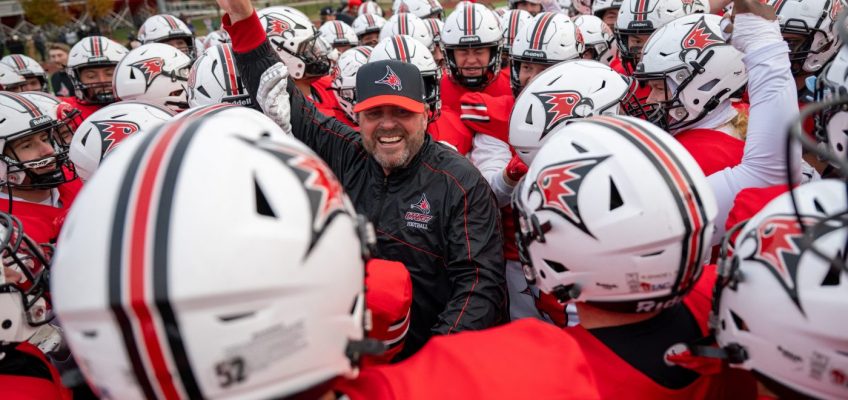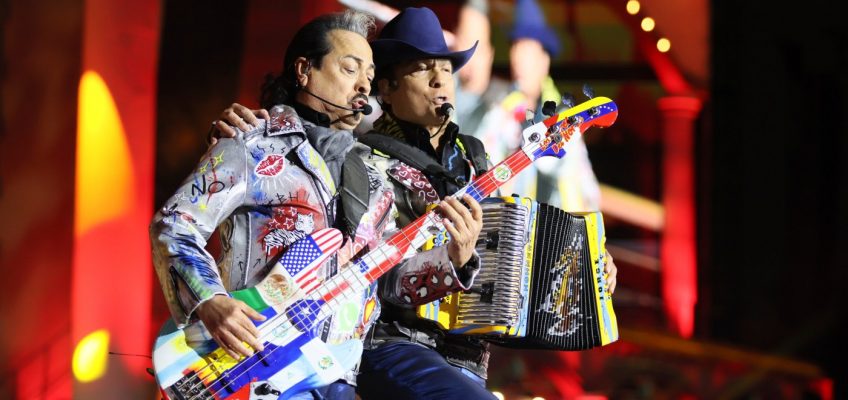Matt Walker stepped onto the University of Wisconsin-River Falls campus in 2011 as a newly-hired, 33-year-old head coach with secret ambitions that, at the time, would have been best described as insane.
He thought the Falcons could win a national championship.
At River Falls? The school lacking the resources of the private schools to its West and the student enrollment of the Wisconsin Intercollegiate Athletic Conference competitors to its East. The program that hadn’t been to the Division-III playoffs since the mid-1990s and won one game prior to the new coach’s arrival.
Walker thought he could win big … here?
“I honestly wouldn’t have taken the job if I didn’t think we had a shot to do it,” he said this week. “I had some options (for jobs). I was in a nice spot to be picky and choosy. I wanted into the best league in the country if I could get in, but it had to be a situation where I thought we could win it all one day.”
Walker knew it required a build, one that could take some time. You don’t go from the WIAC cellar to the penthouse at a moment’s notice, or even in a decade.
The Walked-led Falcons won one game in 2011. Then two, then back to zero. Even in the years River Falls felt it had a solid team, the result was only a few wins.
Three-straight four-win campaigns from 2015-17 were followed by three wins in 2018, and two in 2019. The Falcons were 23-67 over Walker’s first nine seasons. Championship contention didn’t appear to be in the cards.
“I definitely had moments of hesitation and frustration in those early years,” Walker said. “It’s like, ‘Did I do the right thing? Am I doing the right thing? Did I screw up?’ I questioned, at times, ‘Can I ever do it?’ ”
His boss believed otherwise.
Wisconsin-River Falls athletics director Crystal Lanning received correspondence from frustrated alums and program followers over the years asking if a change might be necessary. Such is life in college athletics. But her response was always the same: “We are doing everything the right way. The wins will come.”
“It was just stressing patience and please stick with us and please continue to support the program,” Lanning recalled. “There certainly were times when people were reaching out and questioning. I was just steadfast in my response that we believed things were going to improve.”
Undated courtesy photo of Wisconsin-River Falls football coach Matt Walker, who was recently again named the WIAC Coach of the Year. (Carly Lynch / University of Wisconsin-River Falls)
“Fortunately,” she added with a laugh, “they have improved.”
To put it mildly.
Walker was recently named the WIAC Coach of the Year for the second time in five seasons. The Falcons have five straight seven-plus win campaigns, with this season serving as the best to date. River Falls claimed the conference crown this fall and notched a playoff win last week — both firsts in a three-decade span.
The third-ranked Falcons host seventh-ranked St. John’s in a third-round playoff game at noon Saturday. The winner will be well-positioned for a deep postseason run at, yes, a potential national title.
Creativity
Lanning came to the university as an instructor and assistant athletic trainer in 2004. Five years later, she was elevated to a senior administrator and assistant athletics director. That job still came with training duties.
She jokes that big moment in her career came when her office moved from the dungeon to the main floor of the severely-outdated, and since demolished, Karges Center building that was lowlighted by red-brick colored floor tiles. No one knows the realities of the Falcons’ athletics department better than Lanning, who became the department’s interim athletic director in 2016 and had the interim tag removed two years later.
Success requires folks willing and able to work hard, wear multiple hats and get creative — maybe be a little insane. Perhaps that’s what drew Lanning, who headed the search committee for the next football coach in 2011, to Walker.
He was once the head baseball and football coach at his alma mater, DePauw, in Greencastle, Ind., while also teaching classes. When Walker first arrived in River Falls, he taught and advised on top of coaching. Those other duties are no longer in Walker’s job description, but you still have to find ways to close gaps on inherent competitive disadvantages.
“We need people who can think creatively and outside the box,” Lanning said, “and he certainly has done that in so many ways.”
Of Wisconsin-River Falls’ 118 players, 105 hail from Wisconsin and Minnesota. But Austin Rush, who leads the team in receptions (59) and is tied for the team lead in receiving touchdowns (six) is a product of Yuma, Ariz.., one of seven Arizonans on this year’s roster.
The Falcons heavily recruit the area. But the same is true of every area college. And many of River Falls’ WIAC counterparts are within driving distance of Illinois, which expands their recruiting territory. What would be the Falcons’ counter to level the playing field?
Walker knew River Falls had to take advantage of its one major benefit: Minneapolis-St. Paul International Airport. The Arizona area was targeted as a state with talent but no Division-III football programs.
Success wasn’t immediate. It took years to build relationships with local high school coaches and uncover which kids were good fits for the program. Stones were being turned. But never more so than in 2020.
A reset
Football was the only WIAC sport to not play a game during the 2020-21 school year amid the COVID-19 pandemic. Walker called the gap year “an important reset” for him to take a breath and re-evaluate. The university’s $63.5 million, largely state-funded athletics complex was helpful, but it wasn’t producing instant dividends. More was required to flip the script.
“We were five, six, seven, eight (years) in, and still struggling even when we thought we had some decent teams,” Walker said. “It gave me an opportunity to take a step back and make those creative and bold decisions. We’ve been a little different since then with our decision making and what we have become.”
Lanning recalls conversations with Walker in which the coach told his boss, “I’m going to make a radical change … and it’s going to seem crazy to a lot of people.”
The move was two-fold. Long-time offensive coordinator Jake Wissing was moved to defensive coordinator, a side of the ball completely new to him. Joe Matheson, a student-assistant at the University of Minnesota under Jerry Kill who was just 28 years old at the start of the 2021 campaign, would be elevated to offensive coordinator.
Insanity.
River Falls introduced Matheson’s “top gun” offense, which utilized run-pass options and various formations, all while running a play every 20 seconds.
“That’s made us very, very unique to anybody across the country at any level,” Walker said of the high-tempo approach. “We go faster than anybody.”
The Falcons have run 947 plays this season, 51 more than any other team. They’re averaging a Division-III best 575 yards per game. St. John’s is second at 526. Senior quarterback Kaleb Blaha, a Fridley High School alum, is a frontrunner to win the Gagliardi Trophy awarded to the Division-III player of the year.
Wissing’s defense has gone nine straight games without surrendering more than 21 points.
“It’s some bold stuff. It’s not your grandpa’s football. It can’t be found in the manual of how to coach college football. We do it a very unique way here,” Walker said. “Maybe it took COVID for me to take a deep breath to make those hard decisions that maybe I never would’ve that made us unique and, I think, led to success.”
The grand experiment has born fruit.
“I knew there’d be a possibility that we’d fail at it. You can look pretty dumb sometimes doing it the way we do it. I knew we could look foolish if it didn’t work out,” Walker said. “But the opposite has happened, and it’s been pretty fun.”
Partnership
Walker noted it’s easier to take such risks when you have a support system like he has with Lanning. Not once did the AD ever consider making a change at the top of the football program. Walker said he and Lanning have been “arm in arm” throughout the process, each bringing similar demeanors and big-picture views.
“I would call us normal people in a profession of people that aren’t that normal all the time,” Walker said.
That type of relationship is empowering, and rare.
“I’m pretty blessed. In our profession, having the early, rough years that I did, it’s becoming uncommon to hold onto your job with some of those records that we were spitting out there for a while,” Walker said. “I feel pretty blessed that she hung in there with me.”
The faith wasn’t blind. Lanning described herself as “hands on” in her role. She communicates with each of her head coaches — via text, calls and often in-person visits — on a daily basis. Of course, she always gives processes proper time to play out, but after a couple years “you know whether things are going in the right direction or not.”
Everything outside of the win-loss record suggested the football program was on track.
“I could see everything else behind the scenes was building and he was doing everything the right way and he was taking chances with recruiting in different areas and thinking creatively about, ‘How can I help the program in other ways?’ ” Lanning said. “We knew he was the right person. … When you know you have the right person, just sticking with it, I think, is critical.”
The program’s success has Walker feeling happy for so many people, with current players and coaches atop the list. But he’s filled with joy when he receives messages from alumni, or even sees them at games. Walker notes that everyone who was a part of the program played a role in pushing the ball forward.
Lanning shared a similar sentiment. But as for what’s been most rewarding, she said, it’s been “for Coach Walker to finally have the success.”
“We work so closely on so many of these things,” she said, “and in the down years leading up to COVID, we would talk about it — what can we do differently? To see the patience and to see the consistency and to see the hard work paying off, I just feel so proud for them.”
‘This group is ready’: Young, tested Gophers volleyball team set for NCAA run
Gophers football: Five players plan to enter transfer portal
Barnstorming: Gophers upset No. 22 Indiana 73-64 in Big Ten opener
Gophers football: 3 true freshman who might be instant impact on offense
Gophers football: Signing day tracker for 2026 recruiting class




